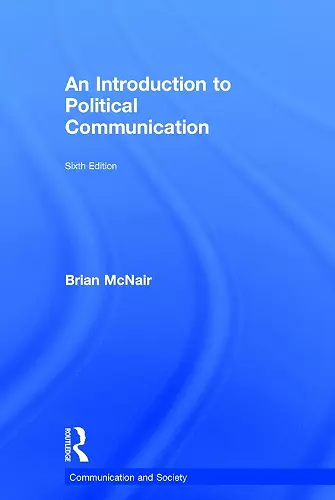An Introduction to Political Communication
Format:Hardback
Publisher:Taylor & Francis Ltd
Published:27th Jun '17
Currently unavailable, and unfortunately no date known when it will be back
This hardback is available in another edition too:
- Paperback£37.99(9780415739429)

At a time of radical shifts in power across the globe, the sixth edition of An Introduction to Political Communication examines the role of the media in the political process. Brian McNair reflects on the role of communication in key events such as the referendum vote for the UK’s withdrawal from the European Union, the rise of nationalist populism in Europe, and the victory of Donald Trump in the 2016 US presidential election. He explores the use of communication as a weapon by Islamic State and other insurgent organisations, and by Putin’s Russia in its dealings with the West, including the hacking of Democratic Party emails in 2016. McNair argues that an expanding globalised public sphere and digital media network have transformed political communication, allowing political actors, from politicians and pressure groups to trade unions and terrorist organisations, to bypass traditional, established media in communicating their messages.
This sixth edition of McNair’s classic text has been comprehensively revised and updated to include:
- the 2016 US presidential election and Donald Trump’s rise to power;
- the UK’s EU referendum of 2016, the Scottish independence referendum of 2014 and the ‘snap’ UK general election of June 2017;
- the growing role in political communication of the internet and social media platforms such as Twitter, Facebook and YouTube, and their destabilising impact on the management of political crises all over the world including the shooting down of Malaysian Airlines MH17 and the disappearance of MH370, the Tianjin disaster in China and the Russian intervention in Ukraine;
- Islamic State’s global jihad, and the use of social media as an instrument of terror;
- the growing capacity of WikiLeaks and other online sources, such as the International Consortium of Investigative Journalists, to challenge elite control of information. <
‘To varying degrees, chapters 4-9 all require some updates, if only to the examples cited […] More generally, whether within the existing structure or via entirely new chapters, there is a strong case for the more extensive discussion of ‘political communication in the digital era’, including the use of Twitter/Facebook etc. by the main political parties and the use of the internet by citizens, sometimes to undermine the political messages put out by political actors […] the key advantage of this text is its accessible writing style – students frequently comment that McNair’s book provides by far the most easy to read introduction to the subject.’ – Dr Paul Smith, Senior Lecturer in Media & Communication, De Montfort University, UK
‘The obvious gap would appear to be the Internet, beyond that coverage of political communication within recent contexts is important in this update. I would expect to see detail on the Obama elections and presidential terms, the Arab Spring and subsequent elections […] It is very important for students to have debates around current examples they can engage with […]McNair’s book is the most important and widely read text book in the field, its value is the critical and extensive coverage and maintaining this while updating the material for the second decade of the 21st Century is key to this being as successful as previous editions […]Students tend to prefer accessible and online content, whether this needs to be built in is questionable given that there is a lot of material online anyway.’ – Darren Lilleker, Lecturer (Director of the Centre for Public Communication Research), Bournemouth University, UK
‘This book is excellent. However more aspects on political communication from Asian perspective need to be added […]It will be very helpful if this book included with student resources such as case studies, essay questions and multiple choice question.’ - Santhidran Sinnappan, Assistant Professor, General Studies, Faculty of Creative Industries, Universiti Tunku Abdul Rahman, Malaysia
‘On the whole well developed and organized. Would like to see an opening chapter on the development of politics from a philosophical and historical context […] Would like to see the chapter 9 address also Asian and Latin American countries. It is West oriented.’ – Basilio Monteiro, Assistant Professor, Division of Mass Communication, Journalism, TV and Film , St. John’s University, USA
ISBN: 9780415739412
Dimensions: unknown
Weight: 244g
252 pages
6th edition